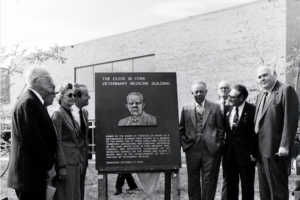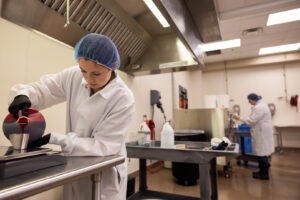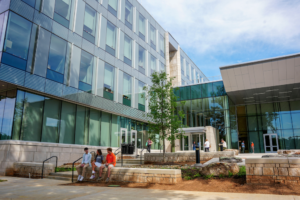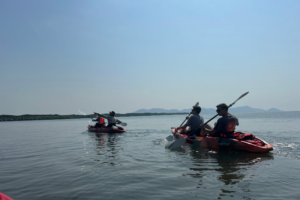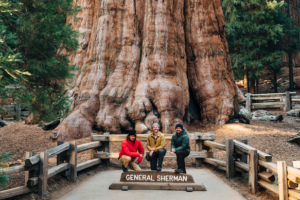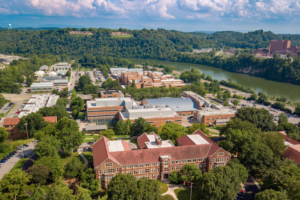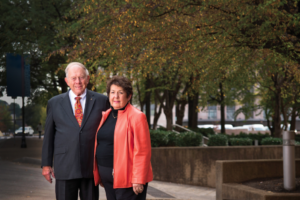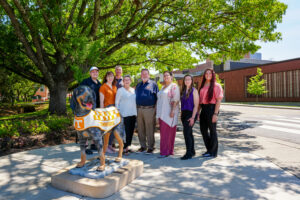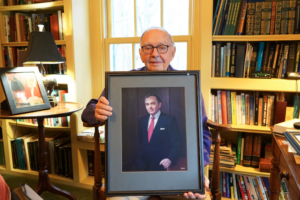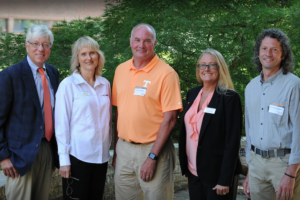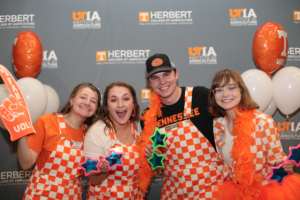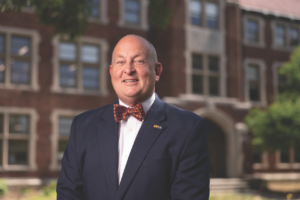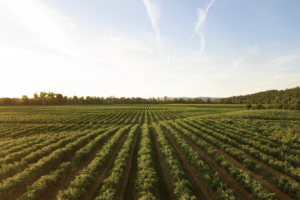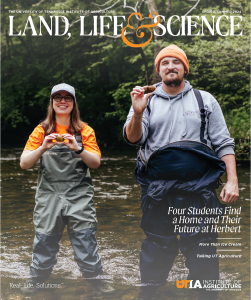
Students come from all over Tennessee and beyond to earn their degrees in the growing Herbert College of Agriculture. Students select Herbert over agricultural study options closer to home for many reasons. Some are drawn to the college’s unbeatable combination of strengths in everything from traditional areas of agriculture to agro-journalism, bioinformatics, and athletic turf management—just three of the dozens of career areas that agriculture has grown to include.
Other students opt for Herbert because they enjoy being a member of a small, close-knit college community amid all the excitement and pluses of a major Southeastern Conference university.
Meet four students from different parts of Tennessee and differing ways of life who found their home, and their future, at Herbert.
Ella McLerran hails from the small Clay County town of Moss near the Kentucky border. She graduated in a class of seventy-seven high school seniors, many of them together since pre-K and kindergarten.
You can bet everyone in Moss knows her, and word is spreading, especially after she became the national champion of the American Farm Bureau Federation Young Farmers & Ranchers Collegiate Discussion Meet this spring. The first comment in the Facebook post by the Tennessee Farm Bureau Federation congratulating McLerran on the win was from her UT faculty adviser, Neal Schrick, professor and head of the Department of Animal Science. “Congrats advisee!!!! Top livestock judging team member as well!” he wrote.
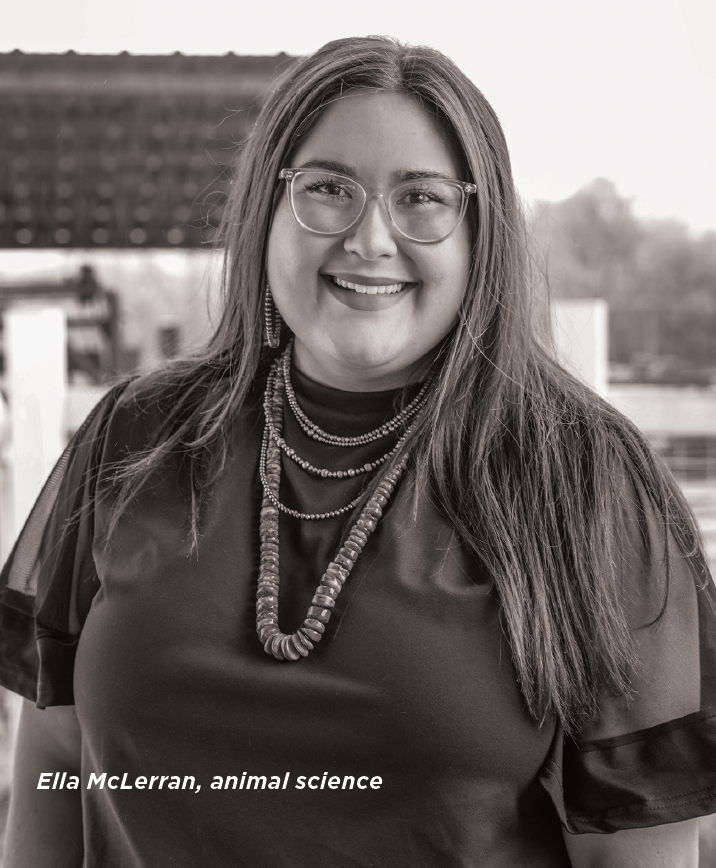
These words might best sum up McLerran’s experience as a Herbert student. She has found something she is passionate about, has support from the faculty and fellow students, and feels like she never left home.
“Going to Herbert is the best decision I made. It’s a home away from home. Within the first few days, I felt like I had a family. You have a personal connection with professors. They take time to see you succeed.”
-Ella McLerran, animal science student
For McLerran, competing in discussion meets and livestock judging is more than a pastime. As a senior majoring in animal science, she is using these experiences to prepare for her career. “I want to work in agriculture as a lawyer and help with policy and policy development and guide what is being developed in law to help farmers,” she says.
She is part of the eighth generation of her family to farm in Clay County. They raise registered black Angus cattle for seedstock. “We’ll see how law school goes,” McLerran says. “I would love to go back to the family farm.”Involvement in 4-H and Future Farmers of America is one way some youth learn about and visit the Knoxville campus before they graduate high school. McLerran was involved in both and came to events at UT and on the UTIA campus. “The first event I remember was in sixth grade for an academic conference for my beef project. I spent a week in Brehm [Animal Science Building], and I felt like I’m going to love coming here when I get older,” she says. “I slowly fell in love with [UT] over time.”
As a senior in high school, Jarrett Tubbs was ready to leave his small town and go to college, but he wasn’t sure where. He applied to UT Knoxville, and his decision was easy after he was named Henderson County’s recipient of the Distinguished Tennessean Scholarship Award, which provides tuition and mandatory fees at UT for one student in each of the state’s ninety-five counties. “It was a no-brainer,” says Tubbs, who recently finished his sophomore year studying in the Department of Agricultural Leadership, Education and Communications in the education concentration.
Like McLerran, Tubbs comes from a farm family. His grandfather, father, cousin, and uncle, and their families all live on what was his great-grandfather’s farm in Darden, located west of Nashville near Parsons. “It is a very, very, very, very small town,” Tubbs says. “The land is flat as far as you can see. My high school is smack dab in the middle of a soybean and corn field.”
As a first-generation college student and self-proclaimed “not a homebody,” Tubbs had only visited UT Knoxville once during his senior year of high school. “Most kids go to UT Martin or UT Martin in Parsons or go to work,” he says. “I was excited to get away.”
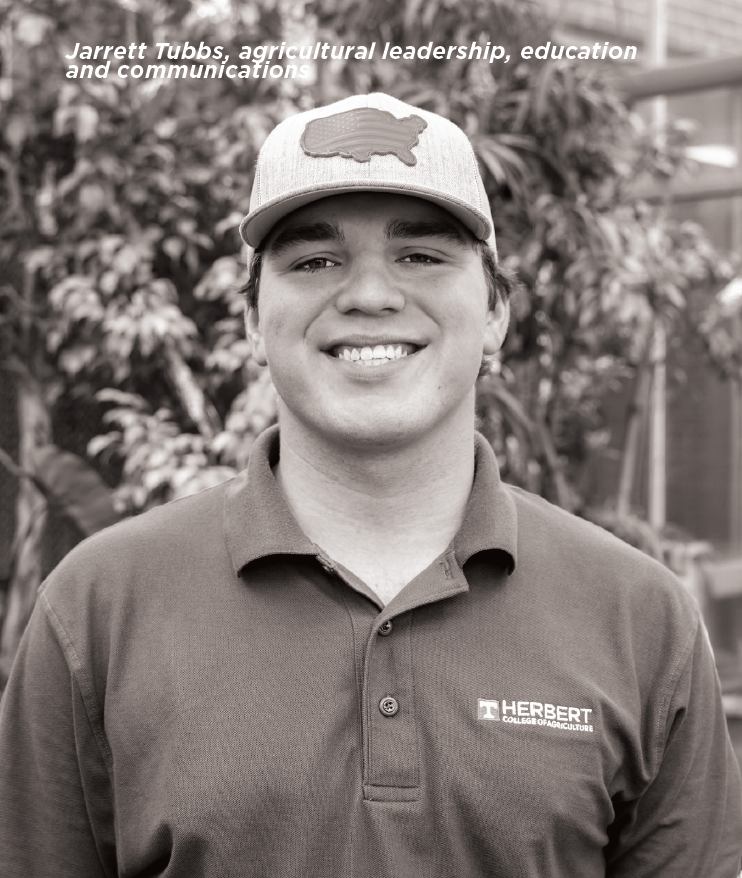
He was involved in 4-H, starting in fourth grade, and Future Farmers of America, which provided some outlet for travel. He served in several leadership roles in his county, the west region, and state.
Tubbs chose the Department of Agricultural Leadership, Education and Communications because he likes the variety of career options the program’s study areas offer him. “I wanted to be a math teacher until I had Algebra I,” Tubbs explains, laughing. “I’d like to teach maybe agriculture and help give back, and then maybe work for Farm Bureau or a youth agriculture organization.”
Whatever his path, he knows there will be support.
“Coming to a large university with 36,000 students, Herbert has about 2,000 students, which is like an average high school. It’s easy to make connections and make this place a home.”
-Jarrett Tubbs, agricultural leadership, education and communications student
Not all Herbert students are from farms or have an interest in agriculture or livestock. Take, for instance, Ainsley Lane, who thought she wanted to be a veterinarian until she came to campus and found her true niche.
Lane, who is from suburban Signal Mountain near Chattanooga, applied to UT Knoxville to humor her father, Theodore Lane, a 1996 sociology graduate. They scheduled tours of UT and Auburn, both with veterinary schools, on back-to-back days. First, they visited Knoxville and toured Herbert. Lane was quiet on the hour-and-a-half drive home. “My dad asked if we were going to Auburn tomorrow, and I said, ‘No, absolutely not.’ I knew UT was where I wanted to go,” she says.
As a freshman in pre-vet, Lane realized a medical field was not for her. She still wanted to work with animals and enjoyed being outdoors, so she switched majors to wildlife and fisheries science and hopes to find a career as a wildlife biologist. “Herbert helped me figure out what I want to do,” she says.
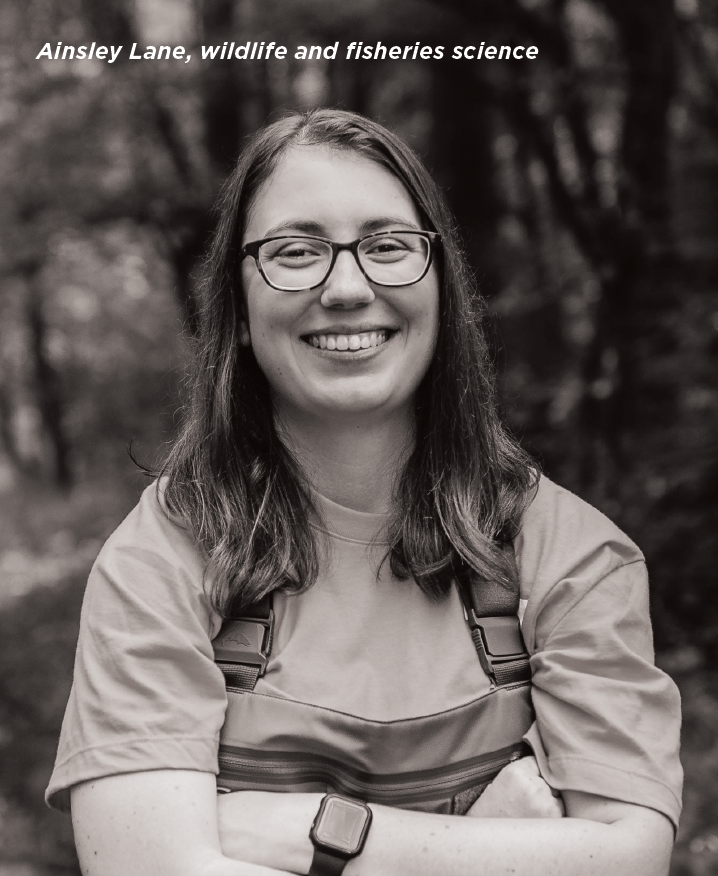
Now a senior, Lane went to Arkansas this summer to study the tricolored bat, which is suffering as a species from the deadly white-nose syndrome. She looks forward to “fall camp,” the second-to-last semester in her major when all classes are in the field.
Until graduation in spring 2025, Lane plans to tell her story to prospective students as a Herbert Ambassador, leading tours and talking to families. “It’s a full-circle moment for me. I was worried about getting lost in the shuffle, but Herbert condensed it and made it (the size) easier to manage,” she says, adding a shout-out to UTIA Senior Vice Chancellor and Senior Vice President Keith Carver for being very visible on campus and talking with students and parents every opportunity he finds.
“When I’m recruiting kids, it’s nice to alleviate those fears and be able to make an impact. I don’t know where I would be without Herbert.”
-Ainsley Lane, wildlife and fisheries science student
Joshua Saad found his way to Herbert through his love of cooking. He graduated in the spring with a master’s degree in food science after spending three years, one as an undergraduate and two as a graduate student, on a National Science Foundation-funded research project to improve frozen food.
Saad was born in Michigan and then lived in Texas before his family settled in Knoxville when he was in high school. He went to Pellissippi State Community College in Knoxville and graduated with a degree in business administration, but it wasn’t a field he wanted to pursue.
Deciding what to do next, he considered his interest in cooking. He learned to cook Lebanese and other Middle Eastern foods with his mother, Susanne Saad. “Also, I’m a foodie and love to travel,” he says. Saad found his path where he was looking the most—in a cookbook. “It was written by Harold McGee, who is a food scientist and writes more in-depth about the science of cooking for home cooks,” Saad says.
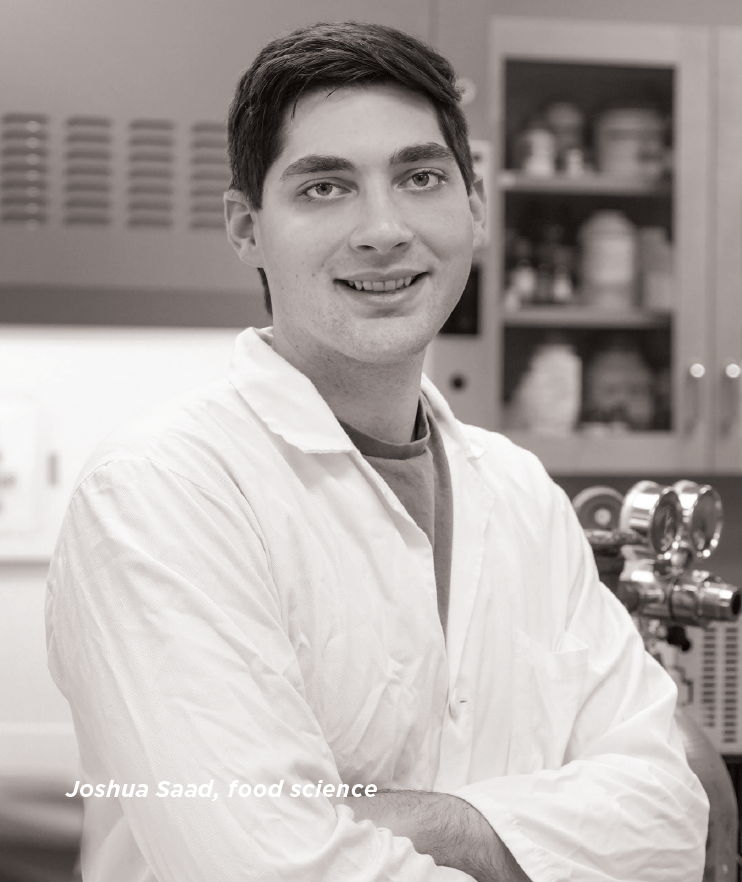
“I looked it up and saw that UT had a food science program, so I went there. It’s the perfect blend of applied science, research, and development.”
-Joshua Saad, food science student
He characterizes his transition to Herbert as a junior as “unique.” Since his first two years were in business administration, he had to take many of the science prerequisites for the food science major. He found the classes interesting and fun, and he appreciated the advisers who helped lead the way. “There was a lot of one-on-one help,” Saad says. “Food science is a pretty small major and tight knit.”
He has been part of a team with food science faculty and Oak Ridge National Laboratory researchers studying ways to prevent freezer burn and food degradation in frozen meats and vegetables. They are trying to stop the growth of ice crystals and find a food-safe and cost-effective anti-freeze agent. Saad’s work has focused on chemical modification in proteins like chickpeas and soy that promote anti-freeze properties. He filed a patent on a molecule in chlorophyll and published three papers: all outstanding achievements for a student.
“Food science wears a lot of caps with chemistry, microbiology, and engineering, and covers so many fields,” says Saad, a first-generation college graduate. “The stars really aligned for me.”
For these students and their classmates, Herbert has been a home and far more than that. It’s been a place where they have found their footing and their futures—a process in which everyone in the college is invested in developing leaders of tomorrow.
Explore More on
Cover Articles
MORE FROM THIS ISSUE

